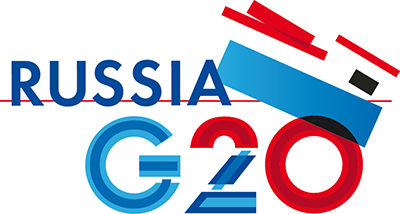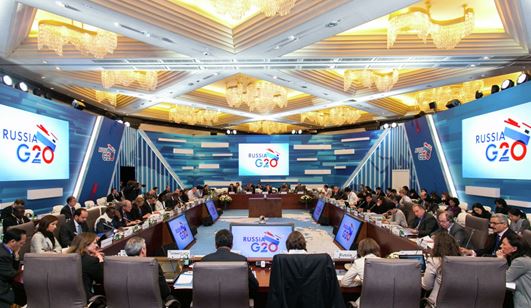G-20
G20 RUSSIA SUMMIT - LEADERS' SUMMIT (5-6 SEPTEMBER 2013)
Topic: International cooperation for economic recovery stimulus: employment, energy sustainability and multilateral trade.
G20 is the main forum for international cooperation focused on global economic and financial issues. It was established in 1999 as an answer of developed countries to the financial crisis of the late 1990s. This crisis revealed the vulnerability of the international financial system under globalization and exposed the lack of involvement of key-countries, developed and developing, regarding international economic issues. The increasing influence of emerging market economies and its disproportionate participation on global decision-making was a major concern as well.
The G20 consists of the world’s twenty largest economies, and, altogether, they represent 90% of global GDP, 80% of global international trade, 2/3 of world population and 84% of fossil fuel emissions, approximately (RUSSIA G20, 2013 c). The main purpose of the group is to promote political coordination and financial regulation in order to involve key-countries in the common effort of curtailing the international financial system vulnerabilities under globalization. Economic stability, sustainable growth and reduced risks are considered major steps in the pursuit of a sound international financial architecture.
One of the major contributions of G20 meetings is the increased role taken on emerging market economies in international decision-making processes, considered under-represented despite their growing economic weight and influence. Among the G20’s main achievements since its founding are the strengthening of the role of these economies, such as: the constitution of the so called BRICS (the group of emerging market economies constituted by Brazil, Russia, India, China and South Africa); the reform of international financial institutions, as the reform of IMF quotas promoted during the South Korea Presidency; the improvement of discipline and oversight over national financial regulators and institutions; and the creation of safety networks for preventing further economic drops in the future (RUSSIA G20, 2013 c).
The Russian Presidency has outlined the main objective of this year’s agenda as the development, on a global scale, of coordinated efforts for boosting balanced, inclusive and sustainable economic growth, as well as job creation. The presidency has also determined three major priorities of such efforts, to be focused on: i) starting a new cycle of economic growth, through quality jobs and investment; ii) trust and transparency; and iii) effective regulation.
The agenda of this committee will contemplate three specific topics of the real agenda, selected due to their interdependence and their policy-oriented character, which are:
- Jobs and employment;
- Energy sustainability;
- Multilateral trade.
These three topics should be taken into account under the considerations defined by the Russian Presidency, which make it possible for delegates to negotiate different points of view and determine policies to be adopted in common.
The G20 Leader's Summit usually takes place on the final months of the year, since it has a strong conclusive character, as it is expected to synthetize the discussions, agreements and consensus achieved on different fora throughout the year in the form of common understandings and commitments to be pursued during the next year. The simulation of the committee will represent an actual round of discussion and negotiation among member-countries' representatives, the essence of G20 as a whole. But, even though it will contemplate only selected topics of the real agenda, the expected final results of the meeting will be the same as its real counterpart: the production of a Final Declaration, stating the negotiated positions and the consensus reached throughout the sessions; and of a Plan of Action, regarding the projects and commitments of each member country for the following years.
From the delegates, intense research skills will be demanded, since they will have to be aware of the national policies, the foreign policies and the previously agreed commitments of each member-country concerning each topic of the agenda; as well as strong parliamentary and negotiation skills, in order to make possible, bearing such positions in mind, the building of a minimum consensus regarding the future positions of each country and of the group as a whole. Remember that, since the 2013 Leaders’ Summit will be practically simultaneous to the simulation, the latter’s results shall remain unforeseen.
 Image 1
Image 1
RUSSIA G20. G20 Leaders' Summit logo. 2013. Available at: <http://www.g20.org/images/78101/74/781017467.png>. Accessed: 01 Apr. 2013.
 Image 2
Image 2
RUSSIA G20. Development Working Group Meeting: Development Working Group Meeting within the framework of Russia’s G20 Presidency. 26 February 2013. Available at: <http://www.g20.org/photo/20130228/781244753.html>. Accessed: 01 Apr. 2013.
REFERENCES
RUSSIA G20. Outreach Strategy of the Russian G20 Presidency. Feb. 2013 a. Available at: <http://en.g20russia.ru/load/781110753>. Accessed: 01 Apr. 2013.
RUSSIA G20. Priorities of Russia's G20 presidency in 2013. 2013 b. Available at: <http://www.g20.org/docs/g20_russia/priorities.html>. Accessed: 01 Apr. 2013
RUSSIA G20. The Russian Presidency of the G20: outline. Dec. 2012. Available at: <http://en.g20russia.ru/load/781110753>. Accessed: 01 Apr. 2013.
RUSSIA G20. What is the G20. 2013 c. Available at: <http://www.g20.org/docs/about/g20_en.html>. Accessed: 01 Apr. 2013. |








